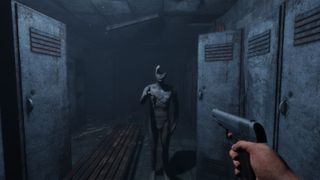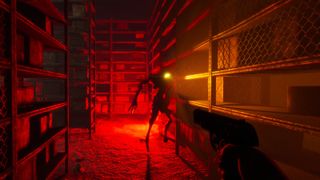The psychological horror of In Sound Mind feels years out of date
The kickable shopping cart made a noble effort, though.

One of the first words you hear in In Sound Mind, growled with malice as the camera sweeps back across a cityscape flooded with oil-slick water, is “curiosity.” It’s something the game is confident you’ll feel. Aren’t you curious about how you’ve woken without memories in this nightmarish apartment building? Don’t you want to find out what’s up with the talking cat, or the hostile entity who refuses to stop bullying you over the phone?
Sadly, my answer was never more emphatic than “I guess?” In Sound Mind can’t quite manage to generate that curiosity. Instead, as I muddled along as amnesiac psychiatrist Desmond Wales to piece together a series of psychological terrors and tragedies, I couldn’t shake the feeling I was playing the same kind of horror game I’ve been playing for a decade or more. Once again, I was trailing the long march of games in the lineage of Layers of Fear, Amnesia, and Condemned, to the same destination: the same grungy hallways, the same scrounging around for flashlight batteries, the same obligatory fascination with insanity. In Sound Mind colors well within the lines.
There are things to like though, many of them visual. The imagery as Desmond’s apartment contorts itself into a surreal mindscape can be genuinely arresting. As you wander beneath whale carcasses and phantom lighthouses, titanic cassette tapes loom over the horizon, their tape reels spinning while audio logs play.

The pools of toxic pharmaceutical sludge are lovelier than you’d expect, and I loved the inky, distorted silhouette of the basic enemies, despite the stiff character animations. Mechanically, some interesting ideas present themselves, like a shard of glass that reveals hidden items behind you when you look into its reflection. There’s a shopping cart that’s more fun to kick than it has any reason to be.
And yes, you can pet the cat.
But otherwise, while it’s perfectly playable, In Sound Mind struggles to make any lasting impact. Its writing and vocal performances land somewhere between corny and melodramatic—although they provide one of the game’s main joys, as you can hang up on the antagonistic voice who calls you throughout the game at will. The puzzle designs are enjoyable enough, but it can be tedious having to fumble with an inventory you can only navigate with directional keys. Especially when I had to reenact a nonsense sales promotion, scanning items on a sequence of abandoned cash registers to match specific prices.
There’s a good amount of mandatory backtracking, often without the kinds of discoveries or revelations that make retreading the same areas feel justified. Instead, your main reward for exploring is the pharmaceutical pills which serve as character progression: collect three of the same type, and you get a stat boost.
The biggest gaming news, reviews and hardware deals
Keep up to date with the most important stories and the best deals, as picked by the PC Gamer team.

If I’m really disappointed by anything, it’s that In Sound Mind never felt particularly horrifying. There are plenty of little jumpscares and spooky thuds, occasional brief glimpses at lurking threats, but nothing that spiked the heart rate as much as I’d hoped. Maybe most damning is that its enemies, including each area’s boss, felt more inconvenient than scary.
It doesn’t help that when In Sound Mind tries to paint with psychology as part of its horror palette, some of its attempts dip from clumsy to tasteless. During a sequence in the nightmarish reflection of a shopping center, it was hard to ignore that the game was asking me to defeat a ghost by repeatedly exposing her to the trigger for her psychosis—essentially asking me to weaponize a woman’s own fatal psychological trauma against her to progress. It felt gross.
Ultimately, In Sound Mind is walking some well-worn paths—the horror equivalent of competently made comfort food. Trust me, though: when you find that shopping cart, give it a few boots from me. You’ll be glad you did.
Lincoln started writing about games while convincing his college professors to accept his essays about procedural storytelling in Dwarf Fortress, eventually leveraging the brainworms from a youth spent in World of Warcraft to write for sites like Waypoint, Polygon, and Fanbyte. After three years freelancing for PC Gamer, he joined on as a full-time News Writer in 2024, bringing an expertise in Caves of Qud bird diplomacy, getting sons killed in Crusader Kings, and hitting dinosaurs with hammers in Monster Hunter.
Most Popular

